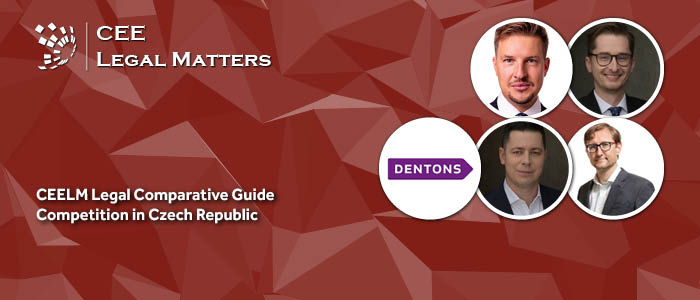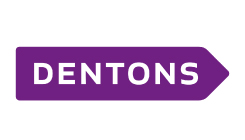Contributed by Dentons.
1. What are the main competition-related pieces of legislation in the Czech Republic?
The main competition-related legislation includes:
a) Act No 143/2001 Coll., on Protection of Economic Competition (Czech Competition Act)
This is the Czech Republic’s key local competition law legislation. The scope includes: (i) anticompetitive agreements and concerted practices, (ii) abuse of a dominant position, (iii) national merger control, (iv) restrictions of competition by public authorities, and (v) powers of and procedure before the Czech Competition Authority (CCA) regarding (i) through (iv).
b) Act No 262/2017 Coll., on Damages Claims in the Field of Competition Law
The act implements Directive 2014/104/EU of 26 November 2014 on certain rules governing actions for damages under national law for competition law infringements and provides for: (i) substantive provisions related to damage claims (including special presumptions and limitation periods, and certain rules on the calculation of damages), and (ii) certain points of procedure, including a special discovery procedure to alleviate the information asymmetry between claimants and defendants.
c) Act No 395/2009 Coll., on Significant Market Power in the Sale of Agricultural and Food Products and its Abuse (Czech SMP Act)
This act transposes among others Directive 2019/633 of 17 April 2019 on unfair trading practices in business-to-business relationships in the agricultural and food supply chain.
The scope includes: (i) the assessment and prevention of unfair commercial practices of a supplier with significant market power in the agricultural and food supply chain, and (ii) the form of the contract between the supplier with significant market power and the buyer.
The SMP legislation is single-sided. This means that only purchasers of food and/or agricultural products, or their alliances in individual relationships with suppliers of those products, are obliged to refrain from the proscribed unfair commercial practices.
d) Act No 215/2004 Coll., on Regulation of Certain Relations in the Area of State Aid
This act deals with the (i) exercise of state administration of state aid, (ii) rights and obligations of providers and state aid beneficiaries and de-minimis aid vis-à-vis the competent national coordinating authority (the CCA), and (iii) certain issues of cooperation between the state and the European Commission in the area.
e) Act No 526/1990 Coll., on Prices
Under certain provisions of this act, a seller must not abuse its superior economic position to obtain an undue pecuniary advantage. The concept of “superior economic position” is not equivalent to that of dominance under competition law and can catch situations of relative market power (see Section 6).
2. Have there been any notable recent (last 24 months) updates of Czech competition legislation?
Yes, 2023 brought quite material amendments to the Czech Competition Act (i) transposing the ECN+ Directive and (ii) supplementing the current law with the practical experience of the CCA. In addition, the Czech SMP Act saw important changes last year, significantly expanding its scope of application.
A) Amendment to the Czech Competition Act – ECN+ implementation
On July 29, 2023, an amendment to the Czech Competition Act seeking mainly to implement the ECN+ Directive (Directive 2019/1/EU) came into force. However, the amendment went significantly beyond what the ECN+ Directive required. The most relevant changes include:
a) The CCA has the possibility to access and use as evidence records and data on telecommunications traffic (wiretaps) obtained by the police in criminal proceedings.
b) Complainants’ identity protection has been enshrined in statutory provisions. Even though in practice it was possible to obtain some protection before, the law now provides that the CCA can adopt measures upon the complainant’s request to protect its identity and conduct the investigation so as to prevent disclosure of the identity to competitors or suppliers/customers if there is a threat of retaliation.
c) In terms of conducting on-site inspections (dawn raids), the CCA is no longer required to specify an address where the dawn raid is to be conducted. It is sufficient to identify the undertaking without having to specify its precise registered office address. This could, in principle, afford the CCA some flexibility to conduct raids across various locations and remove some administrative burden on its part.
d) Changes to the CCA’s “settlement procedure” – The CCA now has the discretion to grant a reduction of 10-20% for undertakings, which cooperate under the settlement procedure. Previously, the reduction was set at a fixed 20%. Additionally, the law now provides that the CCA can also impose a ban on public contracts to undertakings benefitting from the settlement procedure, but for a maximum duration of one year only.
e) The possibility to apply for leniency is no longer limited to cartels (“secret” horizontal agreements or concerted practices). It has been explicitly extended to all “secret” agreements and so can theoretically catch also vertical restraints (such as RPM practices).
f) Other minor changes include:
- The CCA’s role and cooperation within the European Competition Network;
- Members of the association are jointly and severally liable for the payment of a fine in case the association fails to pay;
- Joint and several liabilities for offenses of entities forming a single undertaking;
- Clarification on the conditions under which a ban on participation in public procurement may be imposed.
B) Amendment to the Czech SMP Act
On January 1, 2023, a major amendment to the Czech SMP Act came into force, expanding the range of undertakings in the scope of the Act to all undertakings in the agricultural and food chain in the position of a supplier:
a) Whose turnover exceeds EUR 2 million and at the same time exceeds the turnover of the buyer party, or
b) Whose total turnover in the Czech Republic exceeds CZK 5 billion (approximately EUR 197 million).
The Czech SMP Act basically applies to any undertaking which, even if only marginally, purchases agricultural or food products in the course of their business activities and achieves the relevant turnover. In addition, the new rules apply to purchasing alliances whose members’ turnover exceeds the statutory turnover criteria.
Since January 1, 2024, when the remaining part of the new law entered into force, the CCA has already opened two investigations pursuant to new rules.
C) New proposals introduced by the Czech Competition Authority
In mid-January 2024, the CCA published an outline of several far-reaching legislative proposals aimed at strengthening its powers. The initiative is at an early stage but has already been subject to criticism by legal practitioners for being excessive.
In particular, the CCA seeks to obtain:
a) Power to impose structural changes (remedies) in concentrated markets without the need to prove concrete anticompetitive conduct by any of the undertakings,
b) Access to geo-location data from telecom operators to better detect cartels,
c) Post-closing review of concentrations (a call-in model), and
d) Possibility to grant ‘rewards’ for individual whistleblowers.
According to the proposal, the CCA could:
- Impose remedial measures after a sector inquiry, were it to find a long-term distortion of competition. Measures could take the form of, e.g., FRAND norms and standards, divestments, or unbundling (to various degrees, including organizational and accounting separation) between undertakings’ divisions;
- Conduct full-scale unannounced on-site inspections (dawn raids) without necessarily suspecting the inspected undertaking of any anticompetitive behavior;
- Access telecommunications location data for the CCA, which in practice means that the CCA could remotely monitor the location of individual managers and employees and use that information to prove anticompetitive behavior;
- Have the discretion to call on undertakings to notify transactions for merger control review even if they are below the turnover criteria of mandatory pre-closing notification thresholds (see Section 10). The CCA could do this retrospectively even for completed mergers.
3. What are the main concerns of the national competition authority in terms of agreements between undertakings? How is the sanctioning record of the authority?
The past two years have seen the CCA’s increased activity in investigating and sanctioning antitrust violations. According to the CCA’s 2022 annual report (2023 not yet published at the time of writing), the CCA conducted about 30 antitrust proceedings which was the highest number of cases per year investigated in history. Statistics show that bid-rigging and resale price maintenance cases remain the CCA’s priorities. Fines for antitrust violations totaled CZK 437 million (approximately EUR 18 million) in 2022. The CCA is increasingly strict when it comes to sanctioning dawn raid obstructions and has imposed fines at the statutory maximum (1% of the undertaking’s annual turnover) in a number of cases recently. In January 2024, the CCA issued revised guidelines on procedures for setting fines, with the aim to punish hard core violations of competition law more severely.
In 2023, the CCA issued a special brief on anticompetitive agreements in the employment sector and has settled two cases (without imposing fines) of potentially problematic decisions of associations that sought to create a network of non-compete restrictions in employment agreements across the respective industries.
The CCA has not articulated any particularly welcoming position on sustainability agreements, but in our view, it will in practice take note of the EU Commission’s revised Horizontal Guidelines and considerations on sustainability agreements contained therein.
4. Which competition law requirements should companies consider when entering into agreements concerning their activities in the Czech Republic?
All undertakings entering the Czech market should align their commercial policies with applicable competition law rules, but these correspond to EU competition law rules in most material aspects. For companies familiar with the basic principles of EU antitrust rules, the Czech legal environment should not bring many surprises or necessitate radical changes to corporate policies or business models.
Effective January 1, 2024, the CCA has adopted a guideline on compliance programs, setting out criteria that undertakings’ compliance programs should meet to qualify for an up to 5% discount from any fines imposed for antitrust violations. Adequate internal compliance programs have been accepted by the CCA as a mitigating factor reducing in the final amount of fine in several cases through 2022 and 2023.
5. Does a leniency policy apply in the Czech Republic?
Yes, the leniency program has proved an effective source of leads for the CCA’s investigations of anticompetitive agreements. Similarly to the EU Commission’s leniency program, the CCA will grant immunity to the first leniency applicant to inform about a “secret” anticompetitive agreement, and up to 50% discount from fines to further leniency applicants if they provide some value-added information (all applicants need also to plead guilty and fulfill a further set of standard leniency conditions). In the case of a bid-rigging infringement, successful leniency applicants will also avoid black-listing from public tenders.
Until July 29, 2023, only a party to a “secret” horizontal agreement, i.e., an agreement between competitors, could apply for leniency. Post-amendment, parties to vertical agreements (e.g., a distribution agreement), especially those containing hard core restrictions such as resale price maintenance (RPM), can also apply for leniency. The CCA has found it difficult to uncover the full scope of vertical agreements, particularly in cases of practices with wide market coverage, and so this amendment was meant to encourage undertakings subject to vertical restraints to come forward.
Based on recent public comments of the CCA’s officials, it appears that the authority will be more careful in weighing leniency and settlement procedure applications. For example, where undertakings show only modest efforts to cooperate in detecting the infringements, the CCA may be less generous than heretofore.
6. How is unilateral conduct treated under Czech competition rules?
The Czech Competition Act has a definition of dominant position (and of collective dominance) functionally equivalent to that established by EU courts’ case law with one exception: the law sets a rebuttable presumption of non-dominance if the undertaking’s market share is below 40%.
Similarly, the concept of abuse of dominant position is functionally equivalent to Article 102 of the Treaty on the Functioning of the EU (TFEU). There are two differences in the list of examples of what practices may constitute abuse: unlike Article 102 TFEU, the Czech Competition Act explicitly lists predatory prices and refusal to access to essential facilities as abuses. However, given the established EU case law on these types of abuse, there are no differences in practice (the lists of typical abuses being non-exhaustive in both Czech and EU law). The CCA is empowered to apply Article 102 TFEU to conduct that has an effect on trade between EU Member States.
We see some difference in the frequency of abusive refusal to supply cases – these seem to occur more often in the CCA’s practice than at the EU level. At a recent conference, the CCA officials hinted at a possibility of increased focus on abusive behavior in local markets (such as excessive prices or refusal to supply important inputs in a certain limited geographic area or facility).
Finally, as mentioned above in response to Question 1, unilateral price conduct can be also caught by Act No 526/1990 Coll., on Prices (Act on Prices), which prohibits a seller from using its superior economic position to obtain an undue pecuniary advantage. The concept of “superior economic position” is not equivalent to that of dominance under competition law and can catch situations of relative market power (i.e., market power that stems from the imbalance between specific contractual parties). Czech courts have clarified that infringement of the Act on Prices is a separate infringement from abuse of a dominant position within the meaning of the Czech Competition Act and can be investigated in parallel or as a stand-alone offense. This legislation is typically enforced by the Ministry of Finance (although a sectoral price regulation under this act would be enforced by the appropriate sectoral ministry). Although enforced less frequently, there have been some cases in which the financial authorities have imposed significant fines for this infringement type.
7. Are there any recent local abuse cases of relevance?
Abuse of dominance cases are fairly rare in the Czech Republic: in the past 10 years, the CCA has issued only 17 decisions on the merit involving abuse of dominance, including commitments decisions.
Noteworthy decisions include:
- Ceske drahy, a.s. (2023): The CCA issued a “negative” decision stating that the national railway company had not engaged in predatory pricing on route Praha-Ostrava. The case is interesting mainly procedurally. The CCA launched the proceedings in 2010 following a competitor complaint, but because it was unable to make any meaningful progress, the case was taken up by the EU Commission in 2016, only to be closed six years later without finding an infringement. Resuming its jurisdiction, the CCA finally issued a negative decision in early 2023.
- Honeywell, spol. s.r.o. (2023): The CCA accused Honeywell of tying the provision of maintenance training services and certificates to purchases of certain technical emergency equipment. The CCA accepted Honeywell’s commitment to end the tying practice, without imposing a fine.
- CHAPS spol. s.r.o. (2018): The CCA found that CHAPS had abused its position as an entity having exclusive statutory access to data on public transport connections, by refusing to provide access to that data to downstream service providers (such as consumer app developers). The case is unique even in the European context as the CCA defined a separate relevant market for data even if that data was not traded (so a hypothetical relevant product market). The CCA’s decision was later quashed by the court due to procedural irregularities.
8. What are the consequences of a competition law infringement?
For violation of rules under the Czech Competition Act, the CCA may impose a fine of up to 10% of the undertaking’s or association of undertakings’ yearly net turnover. The same fines also apply under the Czech SMP Act. The CCA has adopted new guidelines on the methodology for setting the fines with effect from January 1, 2024.
If the anticompetitive conduct relates to public procurement procedures (bid-rigging), the undertaking may also be sanctioned with a ban on performing public contracts. The blacklisted undertaking’s identity is then published on the CCA’s website.
The CCA may impose (and accept) proportionate behavioral or structural remedies to ensure that effective competition is maintained or restored.
The latest amendment to the Czech Competition Act brought about two changes to fining rules: (i) if an association of undertakings fails to pay the fine, its member undertakings guarantee its payment of up to 10% of their net yearly turnover, (ii) legal entities that form a single undertaking and participated in an infringement are jointly and severally liable to pay the fine.
In cases of gun-jumping (failure to notify a merger or implementing it before the CCA’s clearance) the CCA can impose fines but also order a de-merger (divestment of the acquired business or other method of unwinding the transaction).
Finally, the most serious types of competition law violations can be criminal offenses under the Czech Criminal Code. In the case of bid-rigging, individuals as well as legal entities can be prosecuted. In cases of other competition law infringements, only individuals can be prosecuted.
9. Is there any competition law requirement in case of mergers & acquisitions occurring or impacting the Czech market?
Local merger control rules are based on the concept of control and turnover thresholds functionally equivalent to the EU Merger Regulation. The CCA has a particularly experienced and effective merger control unit.
It is mandatory to notify even foreign-to-foreign transactions meeting the statutory turnover thresholds. The thresholds can be met even by only one party having any activity in the Czech Republic (this is an issue typically in cases of purely extraterritorial joint ventures). Even though there is a provision in the Czech Competition Law requiring local nexus for a merger to be caught, under the current CCA’s interpretation, any transaction where the undertakings concerned meet the turnover thresholds is taken also to meet the local nexus requirement.
In late 2023, the CCA announced that it would conduct a thorough review of the local merger control regime, including the following aspects:
- Suitability of turnover thresholds (their level, as well as the concept more generally);
- Local nexus requirement (or rather the lack of it);
- Whether the CCA could issue any guidance explaining its policy on the recent developments in EU law, including the EU Commission’s approach to Article 22 referrals of sub-threshold transactions and the Towercast doctrine, under which an acquisition by a dominant undertaking can amount to abuse of dominance;
- Possibility of a call-in model for sub-threshold transactions (see Section 2).
10. What is the normal merger review period?
There are three main statutory timelines in the CCA’s merger control process:
1. In a simplified procedure (criteria for which are largely equivalent to the “old” EU simplified procedure), within 20 calendar days of receiving the complete simplified notification, the CCA must:
- Approve the concentration; or
- Request that the notifying party submit a full (standard) notification.
2. In a standard procedure, within 30 calendar days of receiving the complete full notification, the CCA must:
- Issue a decision that states that the concentration falls outside the jurisdiction of the office; or
- Approve the concentration, provided that the concentration does not result in a significant impediment to effective competition.
Both of the above proceedings can be regarded as analogous to Phase I proceedings before the EU Commission.
3. During the initial 30-calendar day period, if the CCA comes to the conclusion that the concentration raises serious concerns about whether it would result in a significant impediment to competition, the CCA notifies the parties that it will continue investigating, (essentially opening an in-depth Phase II procedure such as under EU law). The CCA must issue its final decision within five calendar months of receiving the complete notification.
If the CCA does not issue any decision within the above deadlines, the concentration is deemed cleared.
Note that the standstill obligation applies until the transaction becomes unappealable, i.e. until the parties waive the right of appeal or on the lapse of the 15th calendar day after the clearance decision has been delivered to the parties. The market practice is to waive the right of appeal on the same day that the clearance decision is issued.
11. Are there any fees applicable where transactions are subject to local competition review?
A fee of CZK 100,000 (approximately EUR 4,000) is payable with the notification to the CCA (irrespective of whether simplified or full – see Section 10).
12. Is there any possibility for companies to obtain State Aid in the Czech Republic?
Companies can obtain state aid under the same conditions as companies in other EU Member States. The substantive and procedural rules for the state aid are directly applicable EU law (treaties and regulations). The state through its departments notifies any state aid measures and schemes to the EU Commission and participates in the approval process. The CCA performs certain coordination roles (see Section 1).
13. What were the major changes brought by the COVID-19 pandemic? Have any of them stuck and how likely is it for these changes to continue to do so in the foreseeable future?
During the pandemic, the CCA struggled with control of practices that spiraled prices of certain indispensable products and services (such as non-perishable food). When revising its guidelines on the methodology of setting the fines (effective from January 1, 2024), the CCA introduced a new example of aggravating circumstance as cases where the anticompetitive conduct concerns indispensable products such as food, pharmaceuticals, or energy.
The CCA had announced that it would not conduct any on-site inspections (dawn raids) at the height of the pandemic, but once the crisis was over, it restarted its dawn raids with much vigor and announced that it would continue investigating with increased frequency.






